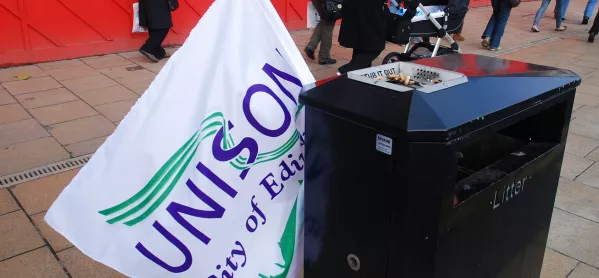Strikes: Which parts of Scotland will be affected?

More than three-quarters of Scotland’s schools could shut when support staff take three days of strike action over pay this month, unions have warned.
Unison said more than 21,000 members will take part in coordinated action from Tuesday 26 September to Thursday 28 September.
Members of GMB Scotland, which on Wednesday called off earlier strikes, and Unite will also take part.
Unions have said workers - including cleaners, caterers, janitors and school support assistants - deserve far more than the 5 per cent pay offer from local authorities’ body Cosla.
- Also this week: New money needed to deal with RAAC, says Scottish government
- Programme for Government: Education secretary Jenny Gilruth’s to-do list for 2023-24
- Covid impact: Scottish pupils’ disrupted journey from primary to senior phase
- Poverty: Free primary school meals for all may not happen before election
Local authority areas affected by Unison strike action are: Aberdeen, Aberdeenshire, Angus, Clackmannanshire, Comhairle nan Eilean Siar, Dundee, Dumfries and Galloway, East Dunbartonshire; East Renfrewshire, Edinburgh, Fife, Glasgow, Highland, Inverclyde, Moray, North Ayrshire, Orkney, Perth and Kinross, Renfrewshire, Shetland, South Ayrshire, South Lanarkshire, Stirling, and West Dunbartonshire.
Unite members will take action in Clackmannanshire, Comhairle nan Eilean Siar, East Dunbartonshire, East Renfrewshire, Fife, Glasgow, North Lanarkshire, Orkney and South Lanarkshire.
School support staff strikes over pay
Johanna Baxter, Unison Scotland’s head of local government, said: “Going on strike is always a last resort - our members want to be in schools supporting children not on picket lines outside them.
“But they have been left with no option. Local government workers overwhelmingly rejected Cosla’s below-inflation pay offer back in March and despite our repeated representations, no improvement has been forthcoming.”
Ms Baxter added: “A real-terms pay cut in the midst of a cost-of-living crisis is a cut our members simply cannot afford. This is not a highly-paid workforce - three-quarters of local government workers earn less than the average Scottish wage.”
In August, Unison members working in schools voted to take strike action with mandates in 24 local authority areas across Scotland.
Sharon Graham, Unite general secretary, said: “The entire blame for this situation is down to Cosla’s ineptitude and the Scottish government’s dithering. Unite’s hard-working council members deserve far more than 5 per cent.”
GMB Scotland members had planned to walk out in 10 council areas for two days next week but suspended that action to join the other unions in the coordinated strike later this month.
Keir Greenaway, GMB Scotland senior organiser in public services, said: “Our members are absolutely essential to the operation of schools and early years, and the support children receive there.
“We have tried repeatedly to find a way forward with Cosla but until an improved offer is made, one that workers believe is acceptable, then disruptive action seems increasingly inevitable.”
A Cosla spokesperson said: “There was a positive meeting of council leaders earlier this week and we hope to meet the trade union colleagues as soon as possible to discuss next steps.”
A Scottish government spokesperson said: “Local government pay negotiations are a matter for local authorities as employers and unions. The Scottish government and Cosla have committed to respect this negotiating arrangement.
“Despite UK government cuts, the Scottish government has provided a further £155 million to support a meaningful pay rise for local government workers, which has been taken into account in the pay offer already made by Cosla.”
The spokesperson added: “The Scottish government urges all the parties involved to work together constructively to avoid strike action by reaching an agreement which is fair for the workforce and affordable for employers.”
You need a Tes subscription to read this article
Subscribe now to read this article and get other subscriber-only content:
- Unlimited access to all Tes magazine content
- Exclusive subscriber-only stories
- Award-winning email newsletters
Already a subscriber? Log in
You need a subscription to read this article
Subscribe now to read this article and get other subscriber-only content, including:
- Unlimited access to all Tes magazine content
- Exclusive subscriber-only stories
- Award-winning email newsletters
topics in this article



